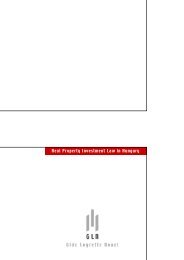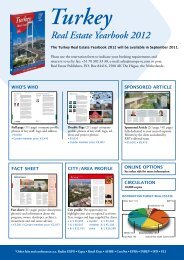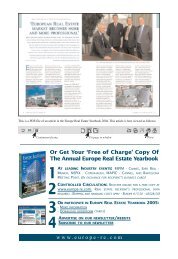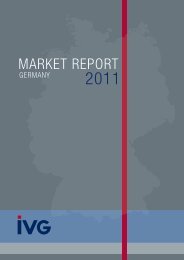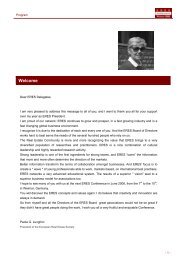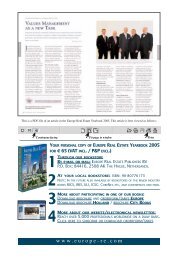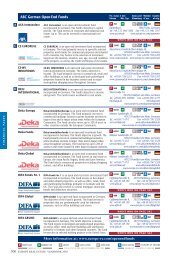DIRECT MARKET REPORT GERMAN RETAIL - Europe Real Estate
DIRECT MARKET REPORT GERMAN RETAIL - Europe Real Estate
DIRECT MARKET REPORT GERMAN RETAIL - Europe Real Estate
Create successful ePaper yourself
Turn your PDF publications into a flip-book with our unique Google optimized e-Paper software.
Rental levels<br />
Not only prime assets in major cities are faced with rising rents as these are<br />
occupied by financially healthy high turnover global franchise companies, but also<br />
in medium sized cities and conurbations. The major difference is the level of<br />
rents. Munich is still the most expensive place to lease retail space (EUR 260/m 2 ).<br />
Cologne (EUR 200/m 2 ), Düsseldorf (EUR 185/m 2 ) and not to forget Leipzig<br />
(+9.5% y.o.y.) due to the improved quality of shops and reversed migration of<br />
spending power. The Peterstrasse for instance has shown EUR 115/m 2 in some<br />
prime units, which is way above the eastern German average. A further increase<br />
is expected. In Berlin a pick-up is visible as well due to revitalisation and<br />
restructuring around the Alexander Platz. The Kurfürstendamm does EUR 200/m 2<br />
today. In other prime areas –in for instance Hamburg- rents remained flat. For<br />
the whole of retail Germany it is expected that rents in prime locations increase<br />
by 3.6%, although clear regional differences must be taken into account.<br />
The study performed by the Hahn Group showed that only 30% of all surveyed<br />
retailers think rents will increase upon renewal. But 56.7% of retailers believe that<br />
rents in newly developed assets will rise, 73.3% expect rent rates of existing<br />
properties to remain unchanged or to rise. 33% think that they are still to reap<br />
the rewards of Germany’s economic growth.<br />
However, the situation in B-grade locations and urban district centres remains<br />
strained. Demand remains reserved and marketing of retail meters is still difficult<br />
considering the constant pressure on rents. In the most positive scenario rental<br />
levels stop declining. In fact, a focused retail trade compatible and urban<br />
development upgrade is recommended for these locations. Investments in newly<br />
custom built multi-functional retail centres with a first class yield oriented<br />
management structure are nevertheless attractive from an investment and tenant<br />
perspective. “We all need to shop”.<br />
Exhibit 28 Rent levels for prime assets in Germany<br />
300<br />
250<br />
200<br />
150<br />
100<br />
50<br />
0<br />
Essen Dresden Leipzig Hamburg Berlin Düsseldorf Cologne Stuttgart Frankfurt Munich<br />
Source: Cushman & Wakefield<br />
Prime retail rents/month Jun-06 Prime retail rents/month Jun-07<br />
Another asset class is distressed retail on promising locations. These properties<br />
are mainly sought by Anglo-Saxon investors, who trust that they can achieve a<br />
speedy turnaround of the objects. This is essentially fuelled by the expectation<br />
that a change of tenant will go hand-in-hand with a mid-term increase of rent,<br />
either by raising the rent or through better exploitation of the rental area. Added<br />
to this is the view that the current economic climate will enable filling the existing<br />
vacancies in the objects with relevant usages and thus to improve rental income<br />
substantially. However, one needs to understand the needs of the indigenous<br />
tenant and market at best.<br />
German retail update - 28/11/2007 31



